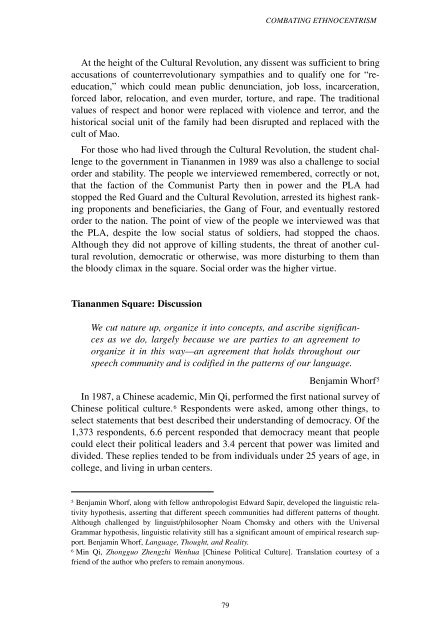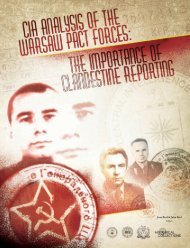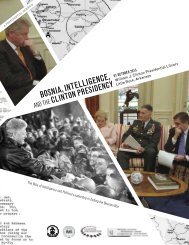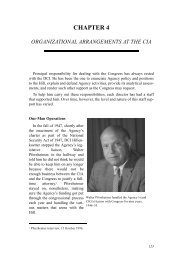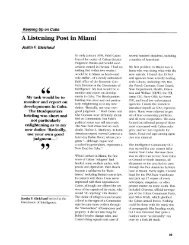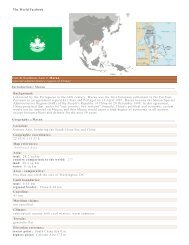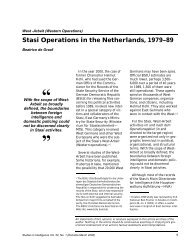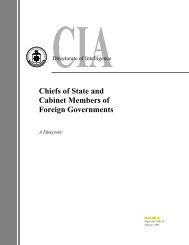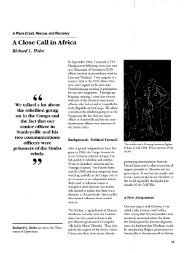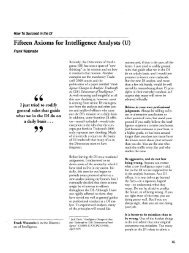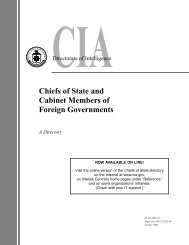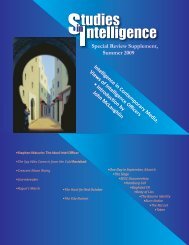Analytic Culture in the U.S. Intelligence Community (PDF) - CIA
Analytic Culture in the U.S. Intelligence Community (PDF) - CIA
Analytic Culture in the U.S. Intelligence Community (PDF) - CIA
Create successful ePaper yourself
Turn your PDF publications into a flip-book with our unique Google optimized e-Paper software.
COMBATING ETHNOCENTRISM<br />
At <strong>the</strong> height of <strong>the</strong> Cultural Revolution, any dissent was sufficient to br<strong>in</strong>g<br />
accusations of counterrevolutionary sympathies and to qualify one for “reeducation,”<br />
which could mean public denunciation, job loss, <strong>in</strong>carceration,<br />
forced labor, relocation, and even murder, torture, and rape. The traditional<br />
values of respect and honor were replaced with violence and terror, and <strong>the</strong><br />
historical social unit of <strong>the</strong> family had been disrupted and replaced with <strong>the</strong><br />
cult of Mao.<br />
For those who had lived through <strong>the</strong> Cultural Revolution, <strong>the</strong> student challenge<br />
to <strong>the</strong> government <strong>in</strong> Tiananmen <strong>in</strong> 1989 was also a challenge to social<br />
order and stability. The people we <strong>in</strong>terviewed remembered, correctly or not,<br />
that <strong>the</strong> faction of <strong>the</strong> Communist Party <strong>the</strong>n <strong>in</strong> power and <strong>the</strong> PLA had<br />
stopped <strong>the</strong> Red Guard and <strong>the</strong> Cultural Revolution, arrested its highest rank<strong>in</strong>g<br />
proponents and beneficiaries, <strong>the</strong> Gang of Four, and eventually restored<br />
order to <strong>the</strong> nation. The po<strong>in</strong>t of view of <strong>the</strong> people we <strong>in</strong>terviewed was that<br />
<strong>the</strong> PLA, despite <strong>the</strong> low social status of soldiers, had stopped <strong>the</strong> chaos.<br />
Although <strong>the</strong>y did not approve of kill<strong>in</strong>g students, <strong>the</strong> threat of ano<strong>the</strong>r cultural<br />
revolution, democratic or o<strong>the</strong>rwise, was more disturb<strong>in</strong>g to <strong>the</strong>m than<br />
<strong>the</strong> bloody climax <strong>in</strong> <strong>the</strong> square. Social order was <strong>the</strong> higher virtue.<br />
Tiananmen Square: Discussion<br />
We cut nature up, organize it <strong>in</strong>to concepts, and ascribe significances<br />
as we do, largely because we are parties to an agreement to<br />
organize it <strong>in</strong> this way—an agreement that holds throughout our<br />
speech community and is codified <strong>in</strong> <strong>the</strong> patterns of our language.<br />
Benjam<strong>in</strong> Whorf 5<br />
In 1987, a Ch<strong>in</strong>ese academic, M<strong>in</strong> Qi, performed <strong>the</strong> first national survey of<br />
Ch<strong>in</strong>ese political culture. 6 Respondents were asked, among o<strong>the</strong>r th<strong>in</strong>gs, to<br />
select statements that best described <strong>the</strong>ir understand<strong>in</strong>g of democracy. Of <strong>the</strong><br />
1,373 respondents, 6.6 percent responded that democracy meant that people<br />
could elect <strong>the</strong>ir political leaders and 3.4 percent that power was limited and<br />
divided. These replies tended to be from <strong>in</strong>dividuals under 25 years of age, <strong>in</strong><br />
college, and liv<strong>in</strong>g <strong>in</strong> urban centers.<br />
5<br />
Benjam<strong>in</strong> Whorf, along with fellow anthropologist Edward Sapir, developed <strong>the</strong> l<strong>in</strong>guistic relativity<br />
hypo<strong>the</strong>sis, assert<strong>in</strong>g that different speech communities had different patterns of thought.<br />
Although challenged by l<strong>in</strong>guist/philosopher Noam Chomsky and o<strong>the</strong>rs with <strong>the</strong> Universal<br />
Grammar hypo<strong>the</strong>sis, l<strong>in</strong>guistic relativity still has a significant amount of empirical research support.<br />
Benjam<strong>in</strong> Whorf, Language, Thought, and Reality.<br />
6<br />
M<strong>in</strong> Qi, Zhongguo Zhengzhi Wenhua [Ch<strong>in</strong>ese Political <strong>Culture</strong>]. Translation courtesy of a<br />
friend of <strong>the</strong> author who prefers to rema<strong>in</strong> anonymous.<br />
79


